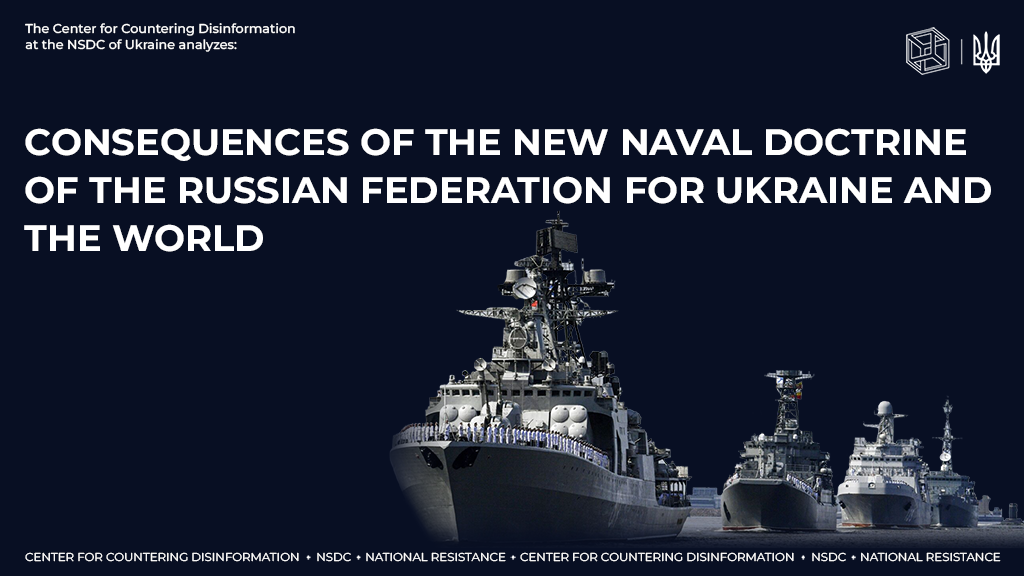Consequences of the new naval doctrine of the russian federation for Ukraine and the world.
On the Day of the Russian Navy on July 31, russian president vladimir putin approved the new Naval Doctrine of the Russian Navy, which replaced the previous one adopted in 2015.
What are its innovations?
The decisive factor in russia’s relations with NATO is the inadmissibility of advancing the Alliance’s infrastructure to the country’s borders.
The main threats to russia are “the course of the United States to dominate the world oceans and the growth of NATO activity”, “the desire of the United States and its allies to limit Russia’s access to the resources of the world’s oceans and vital sea transport communications” and international pressure on Russia.
Russia plans to build new naval bases to “control the safety of maritime transport communications in the Asia-Pacific region.”
The priorities of maritime policy in the Indo-Oceanic and Mediterranean regions are the preservation and support of russian naval presence in the Persian Gulf region, the “development of strategic partnership and naval cooperation” with India, Iran, Iraq, Saudi Arabia and other states of the region.
“Strengthening of the Black Sea Fleet forces and the development of their infrastructure in Crimea” and on the coast of the Krasnodar Territory, an increase in the share of ships sailing under the Russian flag and construction of new port complexes in the Baltic Sea is foreseen.
Intensification of Russian maritime activities on the archipelagos of Svalbard, Franz Josef Land, Novaya Zemlya and Wrangel Island has been foreseen as well.
The new Doctrine allows the use of military force in the event of “exhaustion of the powers of political-diplomatic and other non-force instruments in vital areas of the World Ocean.”
A separate point is devoted to war preparation of civilian maritime infrastructure and provides for the transfer of civilian ships to the russian Navy.
Although the new naval doctrine does not mention the conflict in Ukraine, it certainly appeared against the background of russia’s intensifying conflict with the West over the war in Ukraine, and envisages the “comprehensive strengthening of Russia’s geopolitical positions” in the Black and Azov seas.
Thus, the new russian strategy indicates kremlin’s course for dominance in the World Ocean and global rivalry with the United States by means of the creation of new naval bases in the world, as well as the strengthening of the Black Sea Fleet and encroachment on the Arctic.
From the point of view of maritime jurisdiction, russia’s desire to dominate the World Ocean violates the order established by international conventions on the law of the sea, which poses a threat to the safety of navigation and the protection of the marine environment.
Considering russia’s numerous maritime problems, plans to retain the status of a major maritime power are assessed by Western experts as unrealistic.
This conclusion is justified by the unwillingness of the russian Navy, even equipped with the advertised hypersonic complexes “Zircon”, to respond to the combined forces of NATO and the USA. After all, the US Navy has 11 aircraft carriers with corresponding escort vessels, and russia has one aircraft carrier of a respectable age, the cruiser “Admiral Kuznetsov”, which is currently being repaired. Russia does not yet even have plans to build ships of this class.
The bet on the possibility of using ships of the merchant and fishing fleet for military purposes is limited to:
a small share of russian merchant ships participating in global international transportation,
a bad situation with the research fleet,
international sanctions against russian shipbuilding industry,
claims of foreign states on russian island territories and shelf,
countries’ efforts to weaken russia’s control over the Northern Sea Route.
Thus, the new naval doctrine will cause further aggravation of “Russia-NATO” military confrontation, will finally exhaust russian state budget and strengthen the anti-militaristic attitude of civil society in russia itself.










